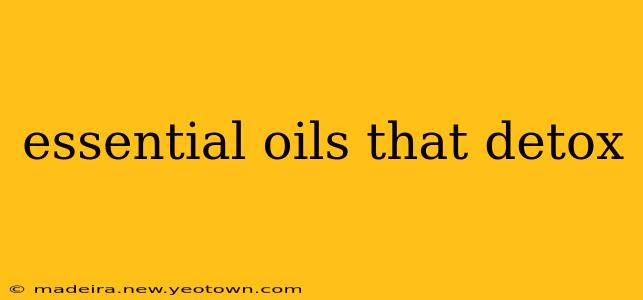The human body is a remarkable machine, constantly working to eliminate toxins. But sometimes, it needs a little extra help. Enter essential oils, nature's potent allies in supporting our body's natural detoxification processes. While essential oils aren't a miracle cure, many possess properties that can assist in this vital function. This journey into the world of detoxifying essential oils will explore their benefits and how they can be incorporated into a holistic wellness routine. We'll go beyond simple lists, delving into the science and safety behind using these powerful plant extracts.
What are the best essential oils for detoxification?
This isn't a simple question with a simple answer. The "best" essential oil for detoxification depends on the individual and their specific needs. However, several oils stand out for their supporting roles in various detoxification pathways. Remember, these oils are supportive and shouldn't replace medical advice or treatment.
Lemon Essential Oil: A Bright Start to Detoxification
Lemon essential oil is a popular choice, often used for its uplifting aroma and refreshing qualities. But beyond its pleasant scent, lemon oil contains limonene, a compound known for its antioxidant and liver-supporting properties. The liver plays a crucial role in filtering toxins from the blood, and supporting its health is a cornerstone of any detoxification plan. Diffusing lemon oil or adding a few drops to water can be a refreshing way to start the day.
Eucalyptus Essential Oil: Cleansing the Airways
Eucalyptus essential oil is well-known for its ability to clear the respiratory system. Its primary component, cineole, has expectorant properties, helping to loosen and remove mucus from the lungs, facilitating the removal of environmental toxins that can accumulate in the respiratory tract. Adding a few drops to a diffuser can be particularly beneficial if you're dealing with air pollution or seasonal irritants.
Tea Tree Essential Oil: A Powerful Antiseptic
Tea Tree essential oil is revered for its potent antiseptic and antimicrobial properties. Its active components help combat bacterial and fungal infections, supporting the body's natural defenses against external toxins and pathogens that can burden the detoxification system. While not directly detoxifying, it supports a healthy environment for the body to function optimally.
Ginger Essential Oil: Supporting Digestive Health
Good digestive health is essential for proper detoxification, as the gut plays a significant role in eliminating waste products. Ginger essential oil, with its potent gingerol compounds, can help support healthy digestion and reduce nausea. A healthy digestive system is less burdened and better equipped to handle the process of detoxification.
Grapefruit Essential Oil: A Metabolic Boost
Grapefruit essential oil is often associated with weight management, but it also supports the body's metabolic processes. A healthy metabolism is crucial for efficient detoxification, as it helps the body convert and eliminate waste products effectively. Its uplifting aroma can also be beneficial for mood, a factor that can significantly impact overall well-being.
How do essential oils help with detoxification?
Essential oils don't directly "detoxify" in the way a cleansing agent might. Instead, they support the body's natural detoxification pathways in several ways:
- Supporting Liver Function: Certain oils like lemon and grapefruit contain compounds that can help support healthy liver function, the body's primary filter for toxins.
- Improving Digestion: Oils like ginger can aid in healthy digestion, enabling efficient elimination of waste products.
- Reducing Inflammation: Some oils possess anti-inflammatory properties, helping to reduce inflammation that can be associated with toxin buildup.
- Boosting Immunity: Oils like tea tree can strengthen the immune system, enhancing its ability to fight off toxins and pathogens.
Are there any risks associated with using essential oils for detoxification?
While generally safe when used correctly, essential oils can pose some risks:
- Allergic Reactions: Some individuals may be allergic to specific essential oils. Always perform a patch test before applying oils to the skin.
- Skin Irritation: Undiluted essential oils can cause skin irritation. Always dilute them with a carrier oil before topical application.
- Interactions with Medications: Essential oils can interact with certain medications. Consult your doctor before using them if you are on any medication.
- Ingestion Risks: Never ingest essential oils unless specifically advised by a qualified aromatherapist or healthcare professional.
What are the different ways to use essential oils for detoxification?
There are several ways to incorporate essential oils into a detoxifying routine:
- Aromatherapy: Diffusing essential oils is a popular method, as it allows the beneficial compounds to be inhaled and absorbed.
- Topical Application: Diluted essential oils can be applied topically to the skin, but always use a carrier oil like coconut or jojoba oil.
- Bath: Adding a few drops of essential oils to a warm bath can be a relaxing and beneficial way to use them.
- Massage: Essential oils can be incorporated into massage oils for a therapeutic experience.
Remember, essential oils are best viewed as supportive tools, not replacements for healthy lifestyle choices. A balanced diet, regular exercise, adequate hydration, and stress management are all key elements of a comprehensive detoxification plan. Always consult with a healthcare professional before starting any new detox program or using essential oils to address health concerns. This information is for educational purposes only and does not constitute medical advice.

